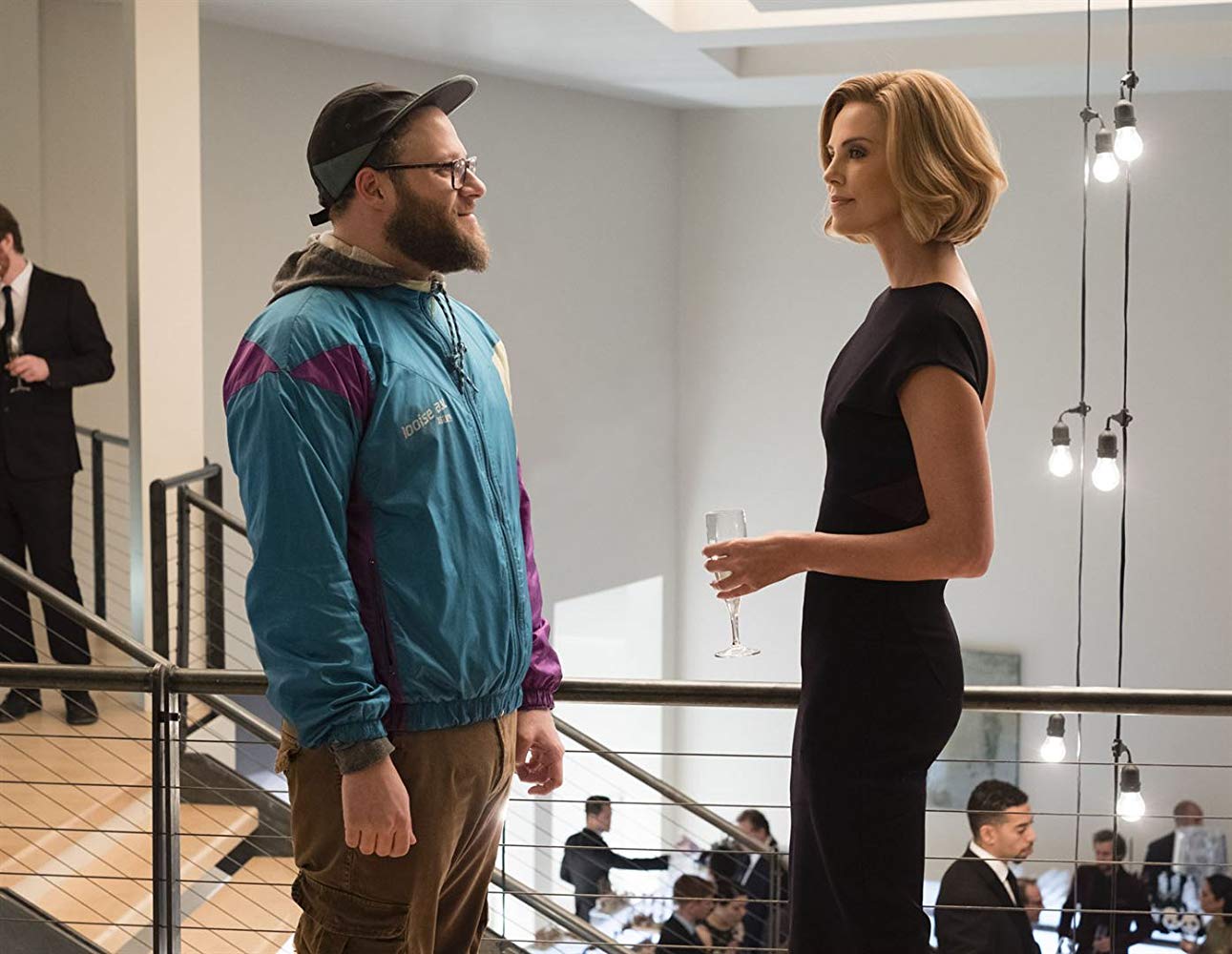Is Seth Rogen hot? It’s a question that the internet has been asking ever since last November when the usually scruffy actor-comedian tweeted a selfie without his signature scraggly beard. It took some getting used to, but the Twitterverse ultimately decided that Hollywood’s favorite stoner was verifiably hot—when he put in the manscaping effort.
Rogen had managed to win over a niche corner of the internet. But could he win over Charlize Theron, one of the most glamorous actresses in Hollywood? In his newest film, director Jonathan Levine puts that far-reaching hypothesis to the test. Long Shot (2019) follows Fred Flarksy (Seth Rogen), a political journalist at an alternative Brooklyn newspaper whose articles are littered with f-bombs and penis jokes—the exact type of hard-hitting journalism you’d expect from a Seth Rogen character. My personal favorite headline, “Why the Two-Party System Can Suck a Dick; Actually, Two Dicks,” offers a nice taste of Fred’s singular style.
The movie opens with Fred trying to infiltrate a white supremacist group for a story. When sternly asked to get a swastika tattoo, he actually gets half drawn on before managing to escape. The half-tattoo, which he eventually turns into a smiling stick figure man, embodies Fred’s deep commitment to reporting the truth.
Those initial scenes inform Fred’s decision to quit his job when a Rupert Murdoch-esque conservative media mogul (an unrecognizably made-up Andy Serkis) buys out the paper he writes for. In need of a pick-me-up, he looks to his wealthy best friend Lance (O’Shea Jackson Jr.). Lance brings Fred to a ritzy fundraiser that houses schmoozing diplomats and a private Boyz II Men concert (yes, the real Boyz II Men). This is where Fred first sees Charlotte Field (Charlize Theron), his childhood babysitter. This is no ordinary nostalgic reunion. When Fred last saw Charlotte, she was running for student government and proposing improvements to the school’s recycling system. Charlotte stayed involved in government and worked her way all the way up to U.S. Secretary of State.
Fred flashes back to an endearing memory of getting an erection in front of teenage Charlotte as she made campaign posters in his kitchen. The episode is hilarious and surprisingly sweet. Prepubescent Fred liked Charlotte because she was his cute older babysitter, but he respected her for being one of the few kids who said they would do something and then actually did it.
Charlotte spots Fred in the crowd, which isn’t exactly hard as he’s wearing a baseball cap and an ill-fitting neon windbreaker at a black-tie event. Despite not having seen Fred since the kitchen erection ordeal, Charlotte recognizes him and they catch up against the backdrop of staring politicians and smooth Boyz II Men ballads. Levine amps up Rogen’s schlubiness and has him looking beardier than ever so that the contrast with Theron’s regal elegance is striking. As a neon windbreaker tries to impress a perfectly-hemmed pantsuit, their awkward reunion is a visual summation of the movie’s title.
The meet-cute conveniently comes right after President Chambers (Bob Odenkirk), an oblivious former TV star, tells Charlotte that he will not be running again in 2020 and wants to endorse her. Bored with the White House, President Chambers’ heart is now set on making the coveted jump from TV to film. The Secretary’s team swiftly plans a world tour to garner support for Charlotte’s bid and her environmental initiative that she has been mulling over since her student government days. The team also briefs Charlotte on some data that reports how to alter her personality to improve her public perception by seeming funnier and less bossy. In need of a new speechwriter to give her campaign the jolt it needs, Charlotte can’t help but think of not-so-little Fred Flarsky.
Charlotte, against her team’s wishes, takes an unconventional risk and makes Fred a job offer. He accepts not just because of the opportunity to tour the world with his 12-year-old crush, but because he genuinely believes her initiative won’t be another hallow piece of voter-bait. Once Fred joins the Secretary’s campaign, the film pivots from a typical Seth Rogen vessel to a more classic rom-com that reaches for a handful of the standard tropes. But instead of a montage of their first dates, we get a montage of Fred following Charlotte around the world and getting to know her in between meetings with policymakers and foreign affairs committees.
Long Shot sets itself up as a retrograde story about a funny man who helps an uptight woman improve her image and advance her career. Thankfully, the film proves more nuanced than that as Charlotte and Fred’s relationship develops into one based on unexpected sensitivity. Charlotte, hardened by her experiences as a woman in politics, struggles to open up to Fred at first. Eventually, it becomes increasingly clearer why she is drawn to Fred: he is not telling her to change, but to be more herself. Fred is the only one on her optics-obsessed team who knows Charlotte, the high schooler who is passionate about recycling and student activism—not the photo-ready, glad-handing Secretary of State.
The Charlotte-Fred coupling plays with power dynamics and gender roles in the same vein as classic rom-com Notting Hill (1999), but instead of Julia Roberts’ glamorous movie star, we have Charlize Theron’s distinguished politician. The script, co-written by Dan Serling and Liz Hannah, replaces fame and fortune with political authority as the hurdle that renders the woman so unattainable. It is an uncommon change to the genre that still feels familiar because of its presentation of a successful woman with questionable likeability and her attempt to get to the White House. Serling and Hannah, who respectively penned The Interview (2014) and The Post (2017), in no way try to hide these real-life parallels. The allusions to the 2016 presidential race are unmistakable; the script remains palatable thanks to their tongue-in-cheek execution. In particular, the character of President Chambers, with his TV background and mildly problematic behavior around Charlotte, could have played poorly if not for the script’s heavy-handed irony and comedic airiness.
Chambers’ boredom with the presidency and obsession with movie stardom underscores Long Shot’s biggest asset: the charm of its two leads. Chambers says he doesn’t want to be someone who just stars in movies; he wants to be a movie star. Few actors have such strong, albeit starkly different, star power as Theron and Rogen. Their individual presences play brilliantly together, with Theron’s grace and wit bouncing off Rogen’s baffling raunchiness to the point that makes you want to watch them do just about anything together onscreen.
For its own good, Long Shot starts as a political satire but finishes as a bonafide rom-com. It gets away with its bold jabs at the current state of American politics because of the Notting Hill-type wish fulfillment at its core. It’s a romantic fantasy—but with the Rogen touch of a few more psychedelic drugs and flailing bodily fluids than the genre is used to.
Though Levine leans more heavily on the “com” than the “rom,” the film could not be successful if the love story at the center did not feel believable. Rogen and Theron’s collective charisma, coupled with their characters’ symbiotic work relationship, highlights the film’s orientation more so toward the complexity of its gender politics than the accuracy (or lack thereof) of its international politics. Long Shot can make a caricature of today’s political climate while retaining its lightness because it is also a film full of lovers’ quarrels, teary-eyed professions of love, and romantic payoffs that will surely produce audible “aww”s in every theater it plays in.
This film is certainly not the first to poke fun at America post-2016, and it will not be the last. But it is probably the first that asks its viewers to seriously consider if Seth Rogen is good enough for the likes of Charlize Theron. In other words, it makes you wonder: is Seth Rogen hot? By the end of Long Shot, you’ll forget you ever asked.






